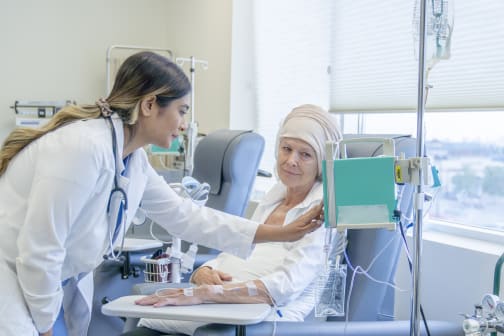Treating biliary cancer
There are several ways to treat biliary cancer, and your healthcare team will help you find the best plan for you. Your treatment will depend on things like where the cancer is, how much it has spread, your overall health, and what you want.
You'll be looked after by a team of specialists who are experts in treating biliary cancer. This section tells you about the different treatments available and what you can expect.
Treatment options for biliary cancer
Treatment goals
Treatment for biliary cancer depends on several factors, including the stage of your cancer, where it's located, your overall health, and your preferences.
Your doctor will explain what your treatment is aiming to do. In general, there are three different goals:
1. To cure the cancer
Some treatments aim to remove all the cancer and cure the disease. This often involves treatment with surgery, sometimes combined with chemotherapy.
Curative treatment works best when the cancer is found early and hasn’t spread.
2. To control the cancer and help you live longer
If the cancer can’t be removed with surgery, treatment can still slow its growth, ease symptoms and help you live well for longer. This may include chemotherapy, targeted therapy, or other treatments that keep the cancer under control.
3. To manage symptoms and improve comfort
When the cancer has progressed, the focus may shift to helping you feel as well as you can. This might involve pain relief, help with eating or digestion, and emotional or practical support.
Supportive (palliative) care can be given on its own or alongside cancer treatment.
Common treatments
Most people with biliary cancer will have a combination of treatments at different stages of their care. Your treatment team will explain what’s recommended for you and in what order.
Common treatments for biliary cancer include:
- Surgery is the main treatment when biliary cancer hasn't spread and can be removed. The type of surgery depends on where the cancer is located in your bile ducts, gallbladder or liver.
- Chemotherapy uses medicines to destroy or slow the growth of cancer cells. It can be used before surgery (to shrink the tumour), after surgery (to reduce recurrence risk) or as the main treatment for advanced cancer.
- Targeted therapy uses medicines that target specific changes in cancer cells. These treatments may be options if your cancer has certain gene changes.
- Immunotherapy helps your immune system recognise and fight cancer cells. It may be combined with chemotherapy for some people with advanced biliary cancer.
- Radiation therapy (also called radiotherapy) uses targeted X-rays to destroy cancer cells. It’s not used as often as surgery or chemotherapy for biliary cancer, but may help in certain situations.
- Clinical trials test new treatments to see if they work better than current ones. Taking part in a trial can provide access to promising therapies and closer medical monitoring.
Getting ready for treatment (prehabilitation)
Getting ready for treatment means helping your body and mind be as strong as possible before you start. It’s like training for a big event — the better prepared you are, the better you’ll cope.
People who prepare often recover faster, have fewer problems after treatment, and feel better overall.
Here are some ways to get ready:
- Move your body: Try to be active in ways that feel safe for you. Even short walks each day can help. An exercise expert (called an exercise physiologist) can make a plan that suits your fitness level.
- Eat well: A dietitian can help you make sure your body has the energy and nutrients it needs. You might need smaller meals more often or use supplements if eating is hard.
- Healthy habits: If you smoke, try to quit. Cutting down on alcohol also helps your body heal and makes treatment easier.
- Look after your mind: It’s normal to feel worried or scared. Talking to a counsellor, practising mindfulness, or learning ways to relax can help you feel calmer.
Your healthcare team can connect you with people who can help with each part of your plan. The most important thing is to start as soon as you can after being diagnosed.


Your treatment team
Treatment for biliary cancer should be provided by a multidisciplinary team. This is a group of health professionals with different skills who work together to give you the best care.
Your main doctor
You should have one main doctor who coordinates your care. This is often:
- a hepatobiliary surgeon (if surgery is planned)
- a medical oncologist (if chemotherapy is your main treatment)
- a gastroenterologist or hepatologist.
The multidisciplinary team
The rest of your multidisciplinary team will be made up of a mix of medical specialists, allied health professionals and supportive care professionals.
Each team member brings special skills to make sure all parts of your care are looked after. They meet regularly to talk about your case and agree on the best treatment approach.
The make-up of this multidisciplinary team may change at different stages of your treatment, but may include:
| Medical specialists | Allied health professionals | Supportive care professionals |
|
|
|
Making treatment decisions
Making choices about your treatment is an important part of your cancer journey.
You have the right to be involved in every decision about your care.
Your healthcare team is there to help you understand your options and support you to make choices that feel right for you.

Understanding your options
To make an informed decision, it helps to know as much as you can about your treatment choices. Your treatment team will explain:
- the different treatment options available to you
- the goals of each treatment (for example, cure, control, or symptom relief)
- the benefits and risks of each option
- possible side effects and how they might affect you
- what treatment involves — how long it takes, where it happens, and how often
- how it might affect your daily life.
Things to think about
Everyone’s situation is different. When making treatment decisions, you might want to think about:
- your personal goals and what matters most to you
- your overall health and how fit you feel
- the side effects and how they could affect your quality of life
- practical issues such as travel, time off work, or caring for family
- your own values, beliefs and preferences.
Questions to ask
It can help to write down your questions before appointments. You might like to ask:
- what treatment do you recommend, and why?
- what is the goal of this treatment?
- what are the benefits and possible risks?
- what side effects could I expect?
- how will treatment affect my everyday life?
- are there other treatment options?
- what happens if I choose not to have treatment?
- is there a clinical trial that might be suitable for me?
- how much will treatment cost?
- who should I contact if I have questions or feel unwell?
Taking your time
Although some treatments need to start quickly, you usually have time to:
- ask questions and get clear answers
- talk about your options with your family or friends
- ask for a second opinion if you want one
- think about what matters most to you before deciding.
Taking time to understand your options can help you feel more confident about your decisions.
Surgery for biliary cancer
Surgery is the main treatment when biliary cancer hasn't spread and can be removed. The type of surgery you need depends on where the cancer is located.
For some people, surgery offers the best chance of long-term survival. However, not everyone with biliary cancer can have surgery. Whether surgery is possible depends on the size and location of the cancer and whether it has spread.
Will I have surgery?
Your surgeon will review your test results and scans to determine if surgery is an option for you. Surgery may be recommended if:
- the cancer is in one area and hasn't spread to other parts of your body
- it's possible to remove the cancer completely
- you're well enough to have the operation and recover from it.
Even if your cancer can be removed with surgery, you might have chemotherapy before the operation to shrink the tumour, or after surgery to reduce the risk of the cancer coming back.
Types of surgery
The type of surgery depends on where the cancer is in your gallbladder or bile ducts.
Surgery for gallbladder cancer
Surgery to remove the gallbladder is called a cholecystectomy. Surgery may be performed as either:
- laparoscopic (keyhole) surgery, where small cuts are made in your abdomen and a laparoscope is used to see and remove the tumour; most cholecystectomies are keyhole surgeries.
- open surgery, where the gallbladder is removed through a large cut (incision) in the upper-right side of your abdomen.
There are different types of cholecystectomy:
- A simple cholecystectomy involves the removal of the gallbladder only
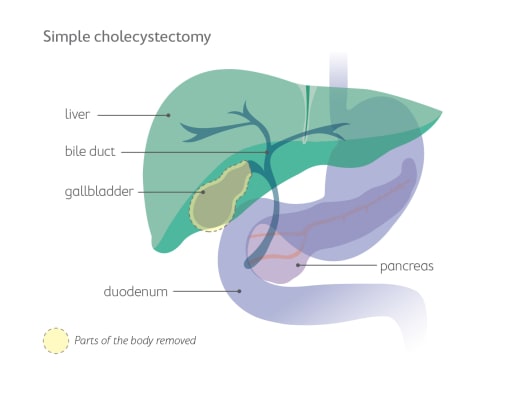
- An extended cholecystectomy involves the removal of all of the gallbladder, part of the liver and all of the surrounding lymph nodes. This is done if the cancer has spread throughout the gallbladder. The lymph nodes may be sent to a pathologist to check for signs of cancer.
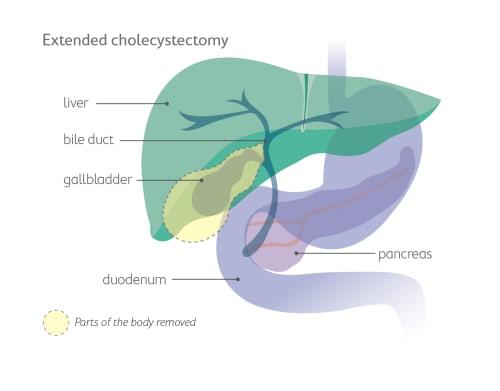
- A radical cholecystectomy involves the removal of all of the gallbladder, part of the liver, the common bile duct and the lymph nodes around nearby organs.
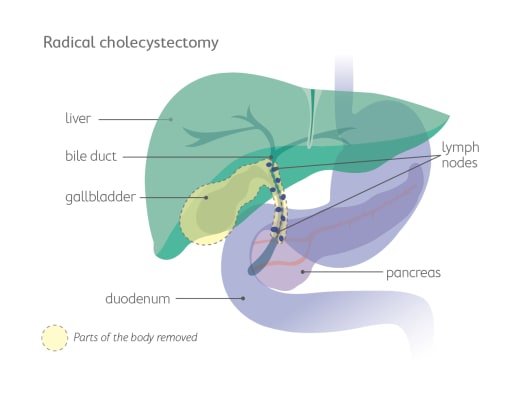
Intrahepatic bile duct cancer surgery (inside the liver)
Surgery to remove cancer that is in a bile duct inside the liver includes:
- A liver resection (hepatectomy). This is surgery that removed part of your liver. How much liver is removed depends on the size of the cancer and where it is located. The liver can grow back to its original size (regenerate) and work normally after a resection.
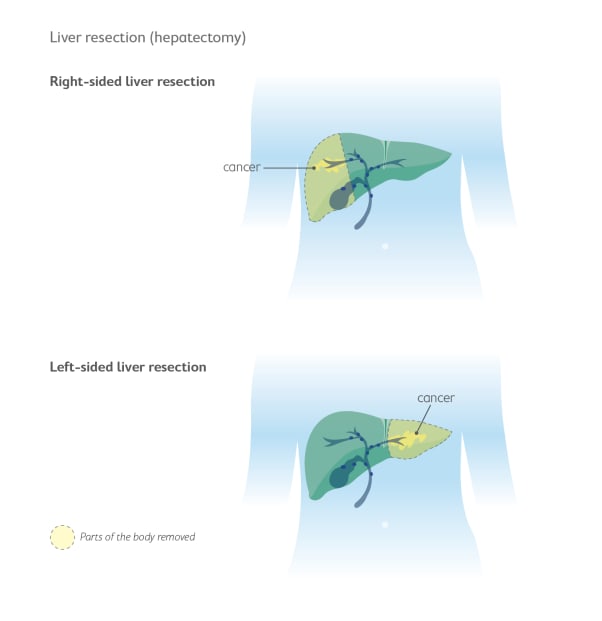
- Before major liver surgery, the surgeon may suggest you have a procedure called portal vein embolisation (PVE). PVE means blocking off part of the blood flow to the area of the liver that has bile duct cancer.
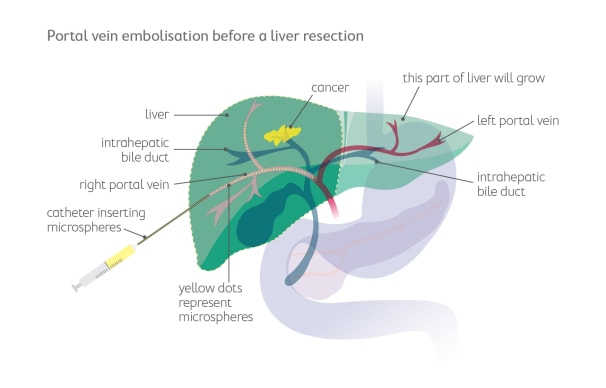
This is done by injecting microspheres into a portal vein (the main blood vessels in the liver). PVE increases the size of the healthy part of the liver by allowing it to grow. This is done about a month before you have surgery to remove the cancer.
Extrahepatic bile duct cancer surgery (outside the liver)
Surgery to remove cancer that is in a bile duct outside the liver includes:
- A Whipple’s procedure (pancreaticoduodenectomy). This surgery involves removing four main parts of your digestive system: the extrahepatic bile duct with the tumour (and nearby lymph nodes), the gallbladder, the head of the pancreas and the duodenum.
In some cases, a small part of the stomach (called the pyloric sphincter) may also be removed.
The surgeon then reconnects your digestive system so that it still works without these missing parts.
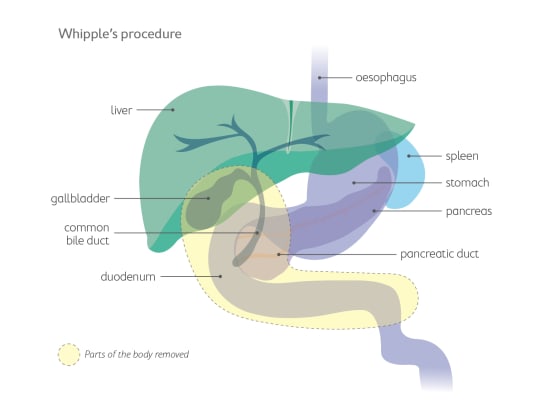
Surgery when the cancer cannot be removed
If the cancer can’t be removed with surgery, other procedures can be performed to improve your symptoms.
Sometimes the cancer can block the bile duct or the duodenum (the first part of your small intestine). This can make you feel sick or uncomfortable. Doctors can do small procedures to help make things work better, even if they don’t remove the cancer.
When the bile duct is blocked
If your bile duct is blocked, bile can’t flow out of your liver. This can make your skin and eyes look yellow and make your skin very itchy.
To help, doctors can put in a stent. This is a tiny tube that keeps the bile duct open so the bile can flow properly again.
The stent can be put in two ways:
- with a thin tube and camera passed down your throat (called an endoscope).
- through the skin on your tummy using a small needle and X-ray guidance.
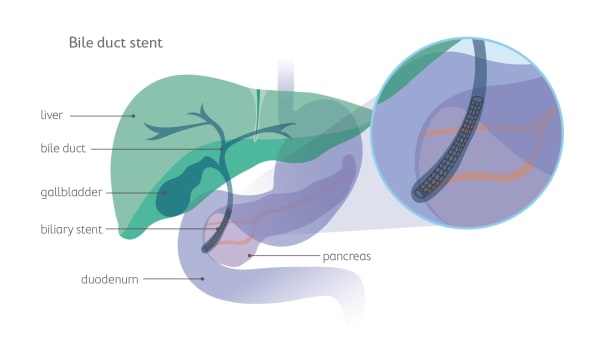
If a stent doesn’t work, you might have an operation called a biliary bypass. In this surgery, the doctor connects your bile duct to another part of your small intestine so the bile can flow around the blockage.
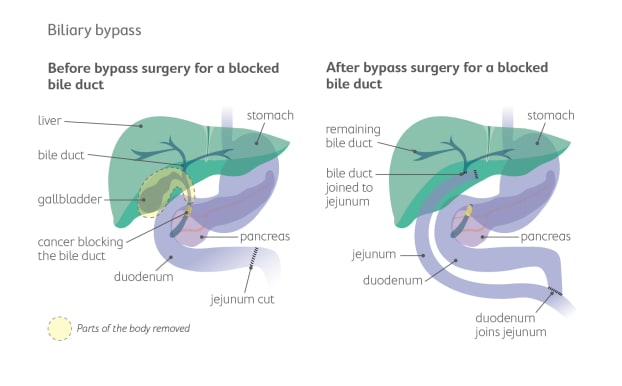
When the duodenum is blocked
If your duodenum (the tube food passes through after your stomach) is blocked, food can’t move through properly. This can make you feel full, sore, or cause vomiting.
Doctors can put in a duodenal stent. This is a tiny metal tube that holds the passage open so food can pass through again.
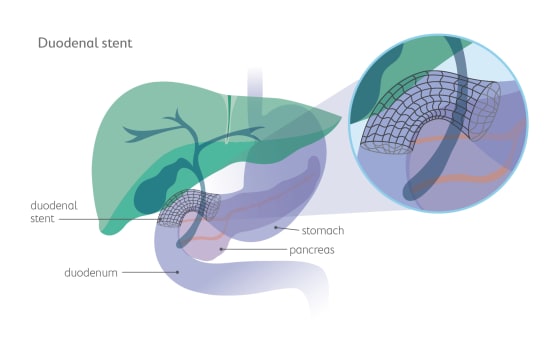
If this doesn’t work, you might have surgery called a duodenal bypass, where the doctor connects your stomach to a part of the intestine below the blockage so food can move through normally.
These procedures don’t cure the cancer, but they help you feel more comfortable and make it easier for your body to work the way it should.
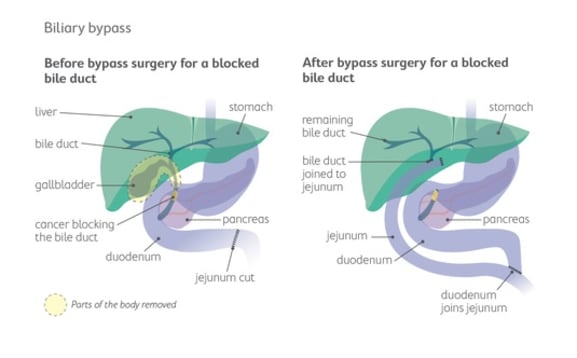
What to expect when having surgery
Before surgery
- You’ll have several tests to check you’re ready for the operation.
- You’ll meet your surgical team to talk about the benefits, risks and what recovery will look like.
During your hospital stay
- Most people stay in hospital for 1–2 weeks after surgery for biliary cancer, though this varies depending on the type of operation and how you recover.
- You may start your recovery in an intensive care or high-dependency unit.
- You’ll slowly begin to eat and drink again.
- Your team will help manage pain and watch for any problems.
Recovery at home
- Recovery can often take a few months. You’ll need some help at home, and it’s important to build up your strength slowly.
- Your care team will schedule follow-up appointments to check your progress.
- Surgery changes how your digestive system works. You might:
- notice changes in digestion
- need pancreatic enzyme supplements (like Creon®)
- experience blood-sugar changes or diabetes
- notice appetite and weight changes.
Your healthcare team will help you manage these effects and adjust your diet if needed. A dietitian can support you with meal ideas and supplements.
Getting support
Having surgery for biliary cancer is a big step. It’s normal to feel anxious or tired. You can ask for help from your care team, social worker or cancer support groups.
Pancare’s Support service can connect you with others who’ve been through surgery and recovery.
Chemotherapy for biliary cancer
Chemotherapy uses special medicines to kill cancer cells or stop them from growing.
For biliary cancer, chemotherapy is often used along with surgery, or on its own to control advanced cancer.
The doctor in charge of your chemotherapy is called a Medical Oncologist.
Will I have chemotherapy?
Your oncologist may recommend chemotherapy:
- before surgery (called neoadjuvant therapy) to shrink the tumour and make it easier to remove.
- after surgery (called adjuvant therapy) to lower the chance of the cancer coming back.
- as your main treatment when surgery isn’t possible, to help control the cancer, ease symptoms, and help you live longer and feel better.
Types of chemotherapy
Chemotherapy can be given in two main ways.
- Through a drip (IV chemotherapy). The medicine goes into a vein through a drip, usually in a hospital or cancer clinic. Each session can take a few hours, depending on your treatment plan.
- As tablets or capsules (oral chemotherapy). Some chemotherapy medicines come as tablets or capsules you take at home. Your oncologist will explain exactly when and how to take them.
What to expect during chemotherapy
Your chemotherapy plan
Your oncologist will design a plan based on:
- the stage of your cancer
- your overall health
- whether you’ve had surgery
- previous treatments
- clinical trials that might be suitable.
Most plans use a combination of drugs that work together to fight cancer cells.
Chemotherapy is usually given in cycles. This means you’ll have a period of treatment followed by a rest period so your body can recover.
A full course of chemotherapy often lasts several months. Your care team will explain the exact schedule for you.
Access devices
If you’re having IV chemotherapy through a drip, your doctor may recommend a device to make treatment easier. This might be:
- a PICC line: a soft tube placed in a vein in your arm and threaded near your heart. It stays in during your treatment so you don’t need needles each time.
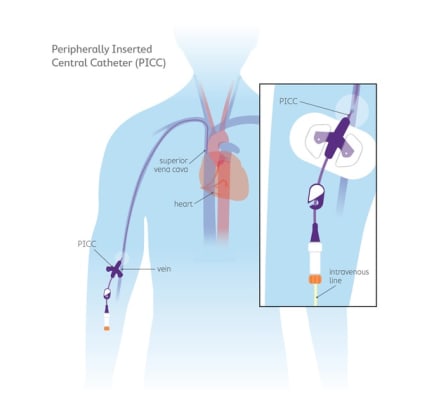
- a Port (Port-a-Cath): a small device placed under the skin of your chest that connects to a vein. It’s accessed with a special needle and can stay in for months.
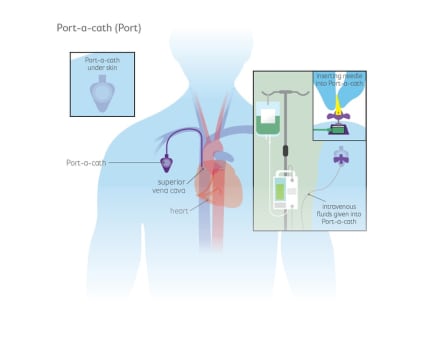
These devices help protect your veins and make treatment more comfortable.
Monitoring during treatment
You’ll have regular check-ups to make sure chemotherapy is working safely.
These may include:
- blood tests to check your blood counts and organ function
- scans to see how the cancer is responding
- check-ins to talk about how you’re feeling and any side effects
Side effects and how to manage them
Chemotherapy can affect healthy cells too, which causes side effects. Not everyone gets the same effects, and most can be managed well.
Common side effects include:
- feeling tired or weak
- feeling sick (nausea) or vomiting
- loss of appetite or changes in taste
- hair thinning or loss
- diarrhoea or constipation
- mouth sores
- numbness or tingling in your hands and feet
- higher risk of infections.
Your team can help by:
- prescribing anti-sickness or infection-preventing medicines
- adjusting your chemotherapy dose if needed
- providing nutrition and pain-management advice
- offering emotional and practical support.
Always tell your nurse or doctor about any side effects. There are often ways to make you feel more comfortable.
Getting support
Chemotherapy can be physically and emotionally tough. You don’t have to go through it alone.
Your care team, a dietitian, or Pancare’s Support service can help you manage side effects, plan meals, and find emotional support.
Targeted therapy for biliary cancer
Targeted therapy is a type of cancer treatment that uses special medicines to attack cancer cells while causing less harm to healthy cells. These medicines work by blocking or changing the signals that help cancer cells grow and spread.
Will I have targeted therapy?
Targeted therapies only work if your cancer has certain gene changes. Not everyone with biliary cancer will be suitable for targeted therapy.
Your oncologist may recommend molecular profiling (genomic testing) to check if your cancer has changes that can be targeted. This involves testing a sample of your tumour to look for specific genetic alterations.
If your cancer has one of these changes, targeted therapy might be an option, usually for advanced biliary cancer when other treatments haven't worked or are no longer working.
Types of targeted therapy
Several targeted therapies have been approved for biliary cancer in people whose tumours have specific gene changes. These include medicines that target:
- FGFR2 fusions – certain medicines can target this genetic change, which occurs in some intrahepatic (inside the liver) biliary cancers.
- IDH1 mutations – medicines that target this change may be used for some intrahepatic biliary cancers.
- HER2 amplification – targeted therapies that work on HER2 may be options for some biliary cancers with this change.
- BRAF mutations – specific medicines may work for cancers with BRAF changes.
New targeted therapies are being developed and tested in clinical trials. The availability of these treatments is evolving, and costs can change if they become listed on the Pharmaceutical Benefits Scheme (PBS).
Your oncologist will let you know which targeted therapies are available at the time of your treatment and whether any might be suitable for you.

How targeted therapy is given
Most targeted therapies for biliary cancer are tablets that you take at home, usually once or twice a day. Some are given as an infusion through a drip into your vein at a hospital or clinic.
Your medical team will explain how to take your medicine, what to do if you miss a dose, and any special instructions (such as taking it with or without food).
Possible side effects
Side effects depend on which targeted therapy you're taking. Each medicine affects the body differently.
Possible side effects may include:
- diarrhoea
- rash or dry skin
- nail changes
- tiredness (fatigue)
- mouth sores
- high blood pressure
- liver problems.
Your treatment team will monitor you closely and help manage any side effects. Always report any new symptoms or problems, even if they seem minor.
Getting support
If you have questions about targeted therapy or need help managing side effects, speak with your oncologist or cancer care coordinator. Pancare’s PanSupport can also provide information and connect you with others who have experience with these treatments.
Immunotherapy for biliary cancer
Immunotherapy is a treatment that helps your body’s own immune system fight cancer. Normally, your immune system protects you from things like germs and damaged cells. But sometimes, cancer cells hide from the immune system.
Immunotherapy medicines help ‘unblock’ your immune system so it can see and attack the cancer cells.
Will I have immunotherapy?
For some people with advanced biliary cancer, immunotherapy is used along with chemotherapy. This combination can work better than chemotherapy alone for certain people.
Immunotherapy may be an option if your cancer:
- has high levels of a protein called PD-L1, or
- has a feature called microsatellite instability (MSI) or mismatch repair deficiency (dMMR).
Your oncologist will discuss whether immunotherapy is right for you based on tests of your tumour and your overall health.
How immunotherapy is given
Immunotherapy is usually given through a drip into your vein (intravenously) at a hospital or cancer clinic.
Treatment is typically given every 2 to 3 weeks, depending on the specific medicine. Each infusion takes about 30 minutes to an hour, though you'll need to stay a bit longer for monitoring.
When immunotherapy is combined with chemotherapy, both treatments are often given on the same day.
Possible side effects
Immunotherapy works by making your immune system more active, but sometimes the immune system becomes too active and attacks healthy cells in your body as well. This can cause inflammation in different organs.
Common side effects include:
- tiredness (fatigue)
- skin rash or itching
- diarrhoea
- cough or shortness of breath
- muscle or joint pain
- loss of appetite
- nausea.
Less common but more serious side effects can occur if the immune system attacks healthy organs such as:
- lungs (causing inflammation and breathing problems)
- intestines (causing severe diarrhoea or abdominal pain)
- liver (causing elevated liver enzymes or jaundice)
- thyroid or other hormone-producing glands (causing hormone imbalances)
- kidneys, heart, or nerves.
These serious side effects are less common, but it's important to watch for them. Your medical team will monitor you closely during treatment.
Getting support
Living with cancer and managing treatment can be challenging. Your treatment team, cancer care coordinator, and Pancare Support can provide information, practical advice, and emotional support throughout your treatment.

Radiation therapy for biliary cancer
Radiation therapy (also called radiotherapy) uses strong X-rays to destroy cancer cells.
In biliary cancer, radiotherapy isn't used as often as surgery or chemotherapy, but it can be helpful in certain situations. It may be used to shrink tumours, control cancer growth, or ease symptoms such as pain or blockages.
Will I have radiation therapy?
Your doctor may suggest radiation therapy:
- before surgery, alongside chemotherapy to shrink the tumour so surgery is easier.
- after surgery to treat any remaining cancer cells near where the tumour was removed.
- to slow down the growth of cancer that can’t be removed by surgery.
- to help ease pain or other symptoms in advanced biliary cancer.
How radiotherapy works
There are different types of radiotherapy that may be used for biliary cancer:
- External beam radiotherapy (EBRT) is the most common type. A machine directs beams of radiation at the cancer from outside your body. Modern techniques allow doctors to target the cancer very precisely while protecting nearby organs.
- Stereotactic body radiotherapy (SBRT or SABR) delivers high doses of radiation very precisely to the tumour in just a few treatment sessions. This may be an option for some people with biliary cancer that can't be removed by surgery.
- Intra-arterial radiation therapy (SIRT) uses tiny radioactive beads injected into the blood vessels feeding the tumour. This delivers radiation directly to the cancer and may be used for some liver tumours.
Your oncologist will discuss whether this approach is suitable for you.
What to expect during radiotherapy
Before treatment
- You’ll have a planning session to prepare for radiotherapy.
- You might have a CT scan to help your team map out the exact treatment area.
- Small dots or tattoos may be placed on your skin so the radiation can be aimed accurately each time.
- Your team will explain how many treatments you’ll need and what to expect.
During treatment
- Treatment usually happens once a day, Monday to Friday.
- Each visit lasts about 15–30 minutes, but the radiation itself takes only a few minutes.
- You’ll lie still on a treatment bed while the machine moves around you.
- You won’t feel the radiation, and you’ll be able to go home afterwards.
- Most people have treatment for several weeks.
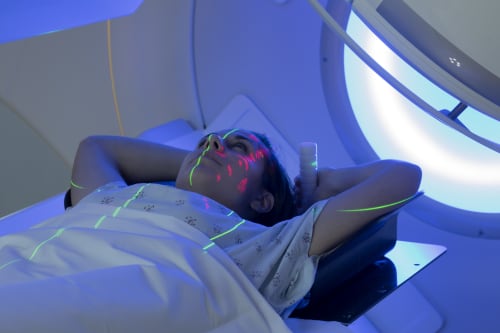
Potential side effects
Side effects usually appear slowly during treatment and improve a few weeks after it finishes. Everyone reacts differently, but common effects include:
- feeling tired
- skin redness or irritation in the treated area
- nausea or loss of appetite
- diarrhoea or softer bowel motions
- discomfort or a warm feeling in the abdomen
Your radiation oncology team will help you manage side effects. They can give advice about:
- gentle skin care
- anti-nausea or diarrhoea medicines
- eating well and maintaining energy
- when to contact your doctor if you’re worried.
Getting support
It’s normal to feel tired or emotional during treatment. Your healthcare team can help with symptom control, nutrition, and emotional wellbeing.
You can also reach out to Pancare Support for practical advice, counselling, and connections with others living with biliary cancer.
Clinical trials
Clinical trials are research studies that test new treatments or new ways of using existing ones. They help doctors find better and safer ways to treat, diagnose, and manage biliary cancer.
For some people, joining a clinical trial can offer access to promising new treatments and specialised care before these options become widely available.
Why consider a clinical trial
Taking part in a clinical trial can give you the chance to try a new approach that may work better than standard care. You’ll be closely monitored by expert doctors and nurses who specialise in biliary cancer.
Even if the treatment being tested doesn’t benefit you directly, your participation helps researchers learn more about the disease and improve care for future patients. Many people find this sense of contributing to progress reassuring and empowering.
What kinds of trials exist
There are many different types of clinical trials.
Some test new chemotherapy drugs or combinations, while others explore targeted therapies that act on specific changes in cancer cells.
Researchers are also studying new ways to use immunotherapy to help the body’s own immune system fight cancer.
Other trials look at surgical techniques, how to better manage symptoms or side effects, or how to detect biliary cancer earlier.
Each trial has its own entry requirements, called eligibility criteria. These might include the type and stage of your cancer, your previous treatments, your general health, and sometimes genetic features found in your tumour.
Your healthcare team can explain which kinds of studies are currently running and whether one may be right for you.
Finding clinical trials
If you’d like to explore current biliary cancer trials, speak to your oncologist or visit trusted websites such as australiancancertrials.gov.au or the Australasian Gastro-Intestinal Trials Group.
You can also contact the Pancare Foundation for guidance and information about studies in Australia.
Complementary and alternative therapies
Many people with biliary cancer look for ways to feel better and support their wellbeing during treatment.
Complementary and alternative therapies are two types of approaches people sometimes use. It’s important to understand how they differ, and how they can safely fit into your care.
Understanding the difference
- Complementary therapies are used alongside standard medical treatments such as chemotherapy or surgery. They aim to help you relax, manage symptoms, and improve your quality of life. Examples include meditation, yoga, massage, acupuncture, and relaxation techniques.

- Alternative therapies, on the other hand, are used instead of standard medical treatments. These approaches have not been proven to treat cancer and can sometimes be harmful or interfere with your care.
For this reason, alternative therapies are not recommended as a replacement for evidence-based treatment.
Complementary therapies that may help
Some complementary therapies can be safely used to help with relaxation or symptom relief, as long as your healthcare team agrees.
- For relaxation and wellbeing: Gentle exercise, yoga, meditation, mindfulness, aromatherapy, massage (with your doctor’s approval), music therapy, and art therapy can help reduce stress and improve mood.
- For specific symptoms: Acupuncture and acupressure wristbands may help reduce nausea or pain. Some people find ginger tea or tablets helpful for nausea.
Simple breathing and relaxation exercises can ease anxiety and support sleep.
Making informed choices
Before starting any new therapy, take time to check that it’s safe and worthwhile.
Talk to your healthcare team. They need to know everything you’re using. You can also ask:
- Is this safe to use with my cancer treatment?
- What are the possible risks or side effects?
- What evidence supports this therapy?
- How much will it cost and how often would I need it?
Follow-up care
After your initial treatment is complete, you'll enter a phase of follow-up care. This is an important part of your cancer journey.
Follow-up care involves:
- regular check-ups with your healthcare team
- watching for signs of cancer coming back
- managing ongoing side effects
- supporting your recovery and wellbeing
- coordinating care between specialists and your GP.

Your follow-up care plan
Every person’s recovery is different. Your healthcare team will create a personalised follow-up plan that explains:
- Who your main contact person is (such as a nurse or specialist)
- How often you’ll need check-ups and who you’ll see
- Which tests you may need and how often they’ll be done
- What to expect at each visit
You may have blood tests (including tumour markers like CA 19-9), and CT or MRI scans from time to time to check for any changes.
These tests help your doctors see how you’re healing and detect any possible signs of the cancer returning early.
Managing ongoing issues
Some people continue to experience side effects after treatment, such as fatigue, digestive changes, or problems with appetite.
Your care team will support you to manage these issues and maintain your strength.
What to watch for
Your doctor will tell you about symptoms that may need to be checked quickly.
These might include:
- new or worsening pain in your tummy or back
- unexpected weight loss or loss of appetite
- jaundice (yellowing of your skin or eyes)
- ongoing tiredness that doesn’t improve with rest
- changes in your bowel habits
- new lumps, swelling or discomfort anywhere in your body
If you notice any of these symptoms, or anything that worries you, contact your healthcare team or GP as soon as possible.
Looking after yourself
Recovery takes time, both physically and emotionally. Keep communicating with your care team and let them know how you’re feeling.
Gentle physical activity, a balanced diet, rest, and emotional support from friends, family, or a counsellor can all make a big difference.
If you’d like extra support, Pancare’s PanSupport service can connect you with nurses, counsellors, dietitians and others who understand what you’re going through.
Want to talk?
Speak to an upper GI cancer nurse or counsellor, we're here to provide you with the support you need. Support available to anyone impacted by upper gastrointestinal (GI) cancer. Monday to Friday, 9am-5pm.

